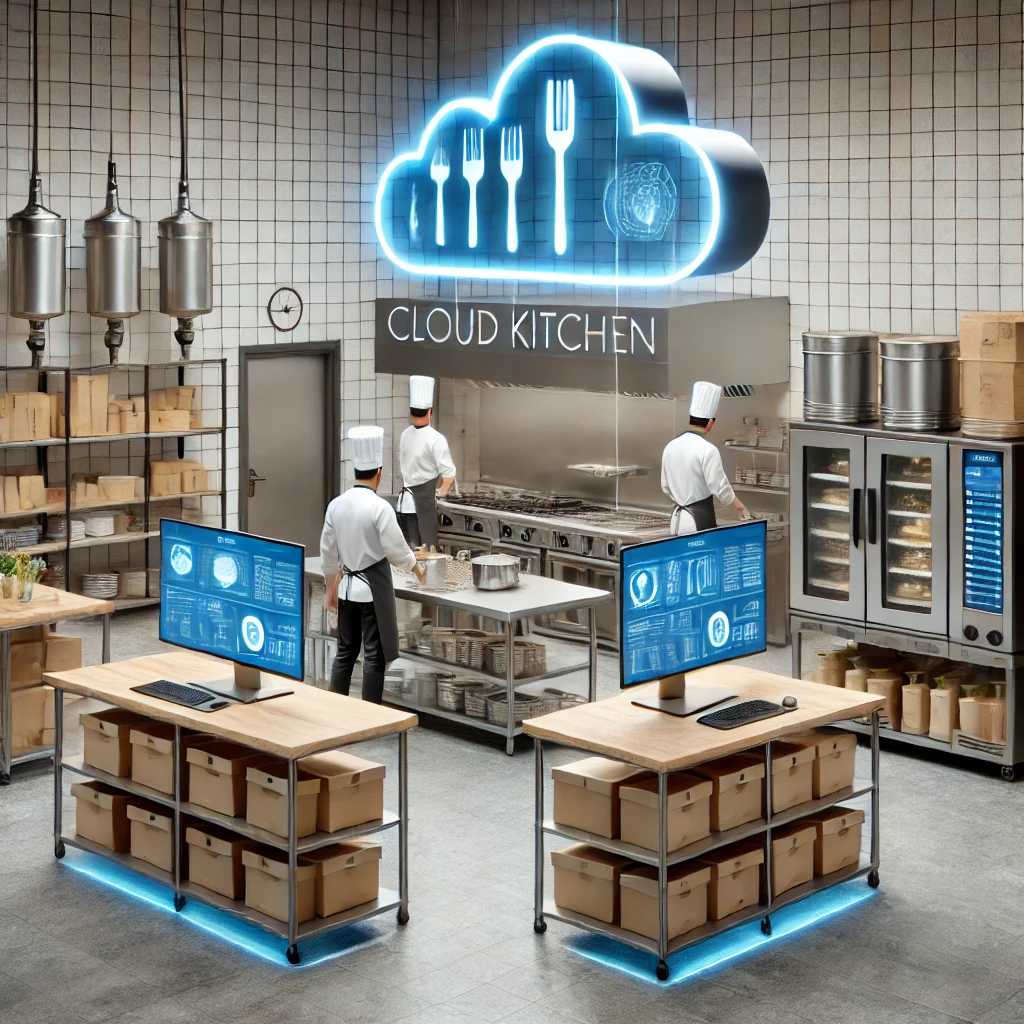Introduction
The Indian food industry has witnessed a significant transformation over the past few years. With the rapid adoption of digital ordering and changing consumer preferences, cloud kitchens have emerged as a lucrative business model. These virtual kitchens operate without a dine-in space, focusing solely on food delivery through online platforms. If you are an aspiring entrepreneur looking to enter the food business, this guide will help you navigate the essentials of starting a cloud kitchen in India.
What is a Cloud Kitchen?
A cloud kitchen, also known as a virtual or ghost kitchen, is a centralized food production facility catering exclusively to delivery and takeaway orders. Unlike traditional restaurants, cloud kitchens eliminate the need for physical dining spaces, reducing overhead costs and allowing businesses to focus on preparing high-quality food for online customers.

Why Cloud Kitchens Are Gaining Popularity
Cost-Effective: Lower operational expenses due to no front-of-house staff and smaller rental space requirements.
Scalability: Entrepreneurs can manage multiple food brands from a single kitchen, expanding their reach without heavy investments.
Increased Demand: The rise of food delivery platforms like Zomato and Swiggy has fueled the demand for cloud kitchens, especially post-pandemic.
Flexibility: Quick adaptation to market trends and consumer preferences without major infrastructural changes.

Steps to Start a Cloud Kitchen
- Understanding the Business Model
Before starting, it is crucial to choose the right cloud kitchen model:
Single Brand Cloud Kitchen: Focuses on one cuisine or specialty.
Multi-Brand Cloud Kitchen: Operates different food brands under one kitchen to cater to diverse customer preferences.
Franchise-Based Cloud Kitchen: Expands an existing brand with standardized operations.
- Legal and Licensing Requirements
To operate legally, obtain the following licenses:
FSSAI License (Food Safety and Standards Authority of India)
Municipal Trade License
GST Registration
Fire and Health Safety Certificates
- Choosing the Right Location
Since cloud kitchens do not require prime real estate, focus on:
High-demand delivery zones with strong online food ordering presence.
Cost-effective rental spaces (₹20,000-₹50,000 per month in metro cities).
Proximity to suppliers to reduce procurement costs.
- Equipment and Setup Costs
A basic cloud kitchen setup includes cooking stations, refrigeration units, storage spaces, and packaging solutions. Estimated investment:
Kitchen Equipment: ₹6-9 lakhs
Initial Rent & Deposit: ₹1-2 lakhs
Marketing & Branding: ₹30,000-₹80,000
Reserve Fund: ₹1,00,000-₹1,35,000 for initial operations
- Marketing & Branding
A strong digital presence is essential for cloud kitchen success. Key strategies include:
Food Aggregator Listings: Registering on Zomato, Swiggy, and Uber Eats.
Social Media Marketing: Engaging content on Instagram, Facebook, and YouTube.
Influencer & Content Marketing: Collaborating with food bloggers and leveraging user-generated content.
- Technology & Operational Efficiency
To streamline operations, invest in:
POS Systems: Integrated billing and inventory management.
Automated Ordering & Delivery Integrations: Seamless coordination with food delivery platforms.
Customer Engagement Tools: CRM systems, feedback management, and loyalty programs.
- Challenges & How to Overcome Them
Customer Experience: Limited interaction can be offset with excellent packaging and personalized follow-ups.
High Commission Fees: Negotiating better terms with food aggregators or establishing direct ordering through a website.
Operational Management: Efficient kitchen workflow planning and staff training.
Future of Cloud Kitchens in India
The cloud kitchen model is expected to grow exponentially, driven by:
Increasing digital food orders.
Established restaurant brands launching virtual kitchens.
AI-driven operational advancements in kitchen management.
Conclusion
Starting a cloud kitchen in India is an exciting opportunity for food entrepreneurs. With proper planning, licensing, and marketing strategies, you can build a successful virtual food business. Focus on quality, innovation, and efficiency to thrive in this competitive industry.


